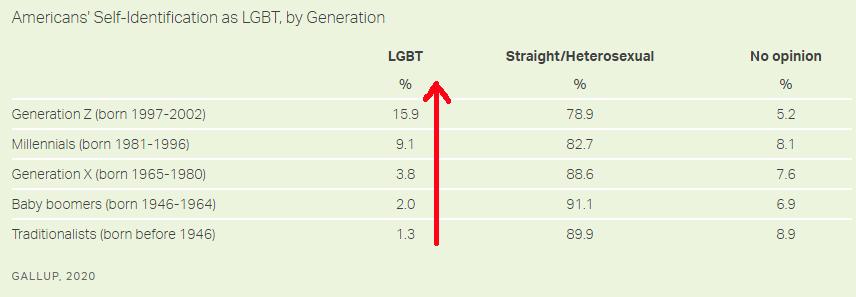Leaderboard
Popular Content
Showing content with the highest reputation on 05/06/21 in all areas
-

Queer sister speaks at 2021 BYU Women's Conference
NeedleinA and one other reacted to Just_A_Guy for a topic
Suzie, I hope what you say is true. But the thing is, for the last thirty years the party line has been that what you describe—a LGBTQ individual finding contented fulfillment in a lifelong commitment to celibacy—is emotionally, psychologically, neurologically, evolutionarily impossible. And a lot of us are kinda wondering why it’s so desperately important for us to know that a person is deeply tempted to commit a sin he has sworn never to commit, unless he indeed characterizes the issue as a “struggle” and wants third parties to support him in that struggle.2 points -
Not every gay person (adults) in the Church is “struggling” with same sex attraction. They are aware of their feelings and they ACCEPT IT and continue LIVING. It is not a constant battle for many and they don’t want to be seen as addicts “recovering” or “struggling”. In my line of work, I see young men and young women struggling to feel they’re not broken, and seeking (desperately in some instances) the tender love of a mother and father. They long for support from parents and family. Sometimes they do have understanding parents who are cognizant of the difference between loving their child and supporting a lifestyle they don’t believe in. Many parents believe that showing any kind of care or concern for their child is automatically a way to support homosexuality. They use these weapons to manipulate their vulnerable son/daughter. When it doesn’t work out, a few of these parents clearly state that their child is now dead. I see adults as well and many in our Church. The experience is a bit different, they are more grounded and they know where they’re standing. Most of them do want to remain in the Church and they are very much aware that they might not be able to find an eternal companion - but just like Liv, they work every day to be better disciples of Christ. They have callings, they help those in need, they go to the Temple, and they are supported by their leaders. They are in good standing with the Lord and yet… time after time a few people within the Church shows them it is NOT good enough and never will be even if the Almighty God says they can enter His house.2 points
-

Queer sister speaks at 2021 BYU Women's Conference
JohnsonJones and one other reacted to scottyg for a topic
In our ward and stake we actually don't have this problem, but the opposite (at least as far as youth/parents report it to their Bishops). Pre-marital sex is way down amongst heterosexual youth. The only ones that seem to be engaging in sex are those that claim to be gay. Our straight boys have 2 main problems - pornography, and slothfulness. All they do is watch anime and porn, and play video games. Zero ambition to do anything with their lives. The girls have more problems surrounding mental health and abuse of various kinds - depression, anxiety, alcohol, drugs, cutting, etc... Porn use amongst young women is also rising. The number of youth in our stake/area going on dates, and even interacting with the opposite sex, is falling. A counselor in our Stake Presidency is a High School principal, and he has said over the last 5-6 years that attendance at school dances has dropped off significantly. Our priests quorum has 14 relatively active boys, and only 2 of them have ever been on a date. The world is not teaching our youth the proper fundamentals of interacting with the opposite sex...it is teaching the exact opposite of what should be done. Women are taught that men and the patriarchy are dangerous and abusive, and will hold them back; and men are taught that women are a useless waste of time and money.2 points -

Queer sister speaks at 2021 BYU Women's Conference
NeedleinA reacted to Just_A_Guy for a topic
1. I was referring specifically to the parts of your post that I had quoted. I hope many LGBTQ members are enjoying happy, fulfilling lives by seeking to be disciples of Christ and earnestly striving to follow all His commandments, not excluding (and of course, not limited to) the Law of Chastity. 2. The thing is, while I acknowledge that their situations are unique—they are not the only people who struggle with some kind of propensity for sin. What other group of people in the Church who are afflicted with a common weakness, have ever sought validation for the weakness itself and affirmed a hope that the weakness—even if not acted upon—remain a part of their mortal identity? Porn users like myself, don’t. Habitual cussers (also like myself), don’t. Bad spouses and inadequate parents (also like myself), don’t. Drug users, don’t. People who are attracted to children, don’t. Where is the theological or ecclesiastical precedent for this? 3. Yes, but teenagers have walked this road through time immemorial; including in the 1970s and 1980s when Church leaders and institutions were saying and doing some very shocking things. Yet the suicide epidemic came, not in 1975 or 1985; but in the early 2000s as the gay rights movement caught fire. The trauma isn’t in being taught sound doctrine or being held to the behavioral norms that logically flow from that doctrine. The trauma is in the tension between sound doctrine on the one hand, versus distorted definitions of self-worth and self-fulfillment and the meaning of life on the other hand. 4. I didn’t think we needed to debate the question of whether lifelong fulfillment can be found in celibacy, because your last post seemed to acknowledge—indeed, seemed premised upon—the idea that this is something that is indeed happening in the Church on a widespread basis. To the extent that a truly committed, obedient, chaste person finds ostracism in the LDS community upon announcing themselves as LGBTQ and insisting that they have no inclination to have that change—the result, I think, isn’t a factor of cultural homophobia. It’s a factor of the generalized LDS belief that it is both possible and imperative to use the Atonement to at least try to change one’s sinful nature; in conjunction with a sense of bewilderment as to why someone wouldn’t even try to use the Atonement to at least hope for a purification of their nature, while still demanding the privilege of acceptance in a community that is under covenant to do just that.1 point -

The grave has no victory... why do we act like it does?
JohnsonJones reacted to CV75 for a topic
If the grave has no victory, why is it we are sad when people die? I think the reason(s)varies from person to person. Is it a sign that faith truly is not a knowledge of things? Perhaps; it could be a lack of knowledge. Does it show a lack of belief/faith in the gospel? Not necessarily; we awaken our faculties to draw near to God. Are we actually mourning the fact that we are worse off without them? It depends, everyone is different. Are we mourning because we won't see them for a long while? It depends, everyone is different. Was he weeping because he died, or was he weeping because he saw the sorrow of those close to the death? I believe the latter. Are our spirits just naturally inclined to value life since that is the whole purpose of our existence here? Yes, but that does not necessitate sadness with the passing of a loved one: "The afternoon my mother died, we went to the family home from the hospital. We sat quietly in the darkened living room for a while. Dad excused himself and went to his bedroom. He was gone for a few minutes. When he walked back into the living room, there was a smile on his face. He said that he’d been concerned for Mother. During the time he had gathered her things from her hospital room and thanked the staff for being so kind to her, he thought of her going into the spirit world just minutes after her death. He was afraid she would be lonely if there was no one to meet her. "He had gone to his bedroom to ask his Heavenly Father to have someone greet Mildred, his wife and my mother. He said that he had been told in answer to his prayer that his mother had met his sweetheart. I smiled at that too. Grandma Eyring was not very tall. I had a clear picture of her rushing through the crowd, her short legs moving rapidly on her mission to meet my mother." https://www.churchofjesuschrist.org/study/new-era/2003/11/a-matter-of-the-heart?lang=eng So despite there being a deeply rooted belief of an afterlife, our souls cannot help but feel sorrow when there is a loss of life? Not necessarily. Is it possible to experience the death of a close one and feel no sorrow because one's faith in an afterlife is so strong that they know they will see them again? Yes, it is possible. If yes, should we be concerned about the strength of our faith if someone dies and we are sad? I think we should always look for opportunities to increase our faith, and observing (both in the sense of acknowledging and processing instead of denying or repressing) our emotions, in concert with the companionship of the Holy Ghost, is one way to to that.1 point -

US reactions?
LDSGator reacted to askandanswer for a topic
The response from the legal and human rights fraternities and from the Indian community has forced the government to backtrack. The Prime Minister has recently said that no one would ever be punished to the full extent allowable by this law and that the ban would almost certainly not be extended beyond the two weeks that have been announced.1 point -

Queer sister speaks at 2021 BYU Women's Conference
JohnsonJones reacted to LDSGator for a topic
@scottyg To be fair, as a young man in Catholic school we were lectured to quite frequently that we were sinful, lecherous, lazy, immature...while women were virtuous, mannerly, pure, wonderful...it got old. It also got a little silly, if I’m being honest. We’d make jokes about it, even the girls would. The staff and church leadership at the school was too (Naive? Clueless? Politically correct? Stupid?) to see that girls would tease one another into eating disorders and also pressure the boys for sexual activity. No, I have no idea how LDS teach their kids simply because I’m not a parent. But, if you constantly tell me how bad I am don’t be shocked when I act that way. After all, I’m just doing what you said and what you expect. So....1 point -

The grave has no victory... why do we act like it does?
JohnsonJones reacted to Jane_Doe for a topic
My 7 year old daughter is .... well 7 and impatient. She hysterically sobs when we leave Grandma's house like they'll never ever see each other again. I'm sad when we have to leave too, even though I don't sob and understand the bigger picture. I do like being at my folks' house and having them right there in-person. When somebody finishes their mortal journey,. people are sad that they no longer are right there in-person. That's just natural- we like seeing our loved ones and hanging out. Yes, we Saints know that we'll see them again and have that bigger picture, which greatly alleviates the bigger picture sadness. But it doesn't mean we can't also be temporality sad in the moment of loss.1 point -

US reactions?
askandanswer reacted to JohnsonJones for a topic
During the height of Covid-19 a similar item occurred in the US, though I understand it was not as strictly enforced. I had thought to go to Utah to visit some family during the time when it appeared that Covid-19 was on the downward slope but found out that Utah and many other states had a ban on others entering the state at the time or travel through their states. I think it was that if you entered in the states from another (and this was from travel within the United States, not just travel from a foreign nation) you would have to quarantine for 2 weeks. Currently, the US also has had a ban from some nations where you cannot enter the US if you have a positive Covid-19 Test...citizen or not. There were stories of the US citizens that were kept in Mexico for almost two weeks or more because of a positive test from Covid-19. I think that applies to any nation out there with people trying to enter the US. I had a friend who travelled overseas recently who got vaccinated and took precautions, but still prepared just in case they were barred from entering the US due to Covid-19. I do not know the fine or what the punishment is if you defy the US ban. I have not heard much outcry from the public on this, but I have heard some concerns about it from those who travel. I am gearing up for my annual research travel and it has me concerned, though I have all the papers in order to actually do research this summer. It is somewhat talked about to various degrees for and against it by those in the community who travel, I haven't heard a ton about it from the general public though. It may not be as extreme as the Australian ban but it is similar and done for a similar reason I suppose.1 point -

Queer sister speaks at 2021 BYU Women's Conference
Still_Small_Voice reacted to estradling75 for a topic
I think one of the problems people are having with this message.... is that it is only half the message. And only half the message no matter how well intention can cause problems for those that ignore, don't know, or think the other half does not apply any more because it was not talked about. The message is also part of this weeks Come Follow me reading. Its about not casting out people who want to fellowship with us... It is very much a commandment, and it is one that we some times struggle to follow. And we can fail this command in many different ways. So being reminded is good, so that is half the message that is being delivered. The half that is missing is the fact that the command to not cast people out is not an absolute one. Rather it is a conditional one. Everyone has to meet the condition to not be cast out. That condition is kind of important too, but it is not address with any words whatsoever. The condition is rather simple... its "earnestly seeking after the kingdom" Now lets be clear its not a high bar, and thank goodness for that, otherwise many of us might be in trouble. But the bar not being high is not the same as the bar not being set and its requirements not needing to be met. Now for this Sister I think we can safely presume that she is "earnestly seeking after the kingdom." But as a message to those struggling it is a incomplete one. Yes you are welcome with whatever temptations and sins that you might struggle with, but you have to be willing to struggle with it. This is true for everyone no matter their sexual orientation. In her message of welcoming she utterly neglected the Lord's conditions for that welcome.1 point -

In ten years I'll look back and laugh. (Or not.)
Backroads reacted to Carborendum for a topic
I wasn't around 10 years ago on this site. So, I'm laughing now. @Vort, I would offer an alternative interpretation of events. I don't know how the locking mechanism worked at those lockers. So, I may be off. I wonder if some passerby saw an open/unlocked locker with a bunch of someone's stuff and was actually afraid for you (that someone might come by and steal it). So, as a courtesy, he shut the locker for you not realizing that it automatically locked somehow. Still others may have done the same thing and locked it to be secure and didn't stop to consider how to give you the PIN. You know even smart, well-meaning people can do stupid things like that. While the end result was just as comical, the motivation behind it may have been benign.1 point -
They absolutely exist. I have looked them in the eye on a number of occasions. It absolutely exists. I have looked it in the eye on a number of occasions.1 point
-

Queer sister speaks at 2021 BYU Women's Conference
Still_Small_Voice reacted to Vort for a topic
Then conversation is pretty much impossible. You refuse to acknowledge the existence of people of ill intent. You have bought into the idea that no one is really bad, just misguided. Evil doesn't really exist. And no one should ever, ever, ever feel bad about himself, not for any reason. He just murdered his girlfriend and ate her? Just some bad choices. Shame is, by definition, what a healthy person feels when he does something shameful. So unless you're saying that nothing is shameful, your rejection of shame makes no sense. Word games and shifting definitions do not change the reality of things.1 point -

Queer sister speaks at 2021 BYU Women's Conference
Still_Small_Voice reacted to NeedleinA for a topic
Gallup Poll - 2/24/21 QUESTION: I know what some Church leaders think, but I wonder what you think... is this self-identification a learned behavior, perpetuated by people trying to 'normalize' it OR is God simply sending more non-heterosexual individuals to earth in these latter generations? SIDE NOTE: Currently Gallup says 1 in 6 adults of Generation Z identify as LGBT now. If it is a learned behavior, what will the percentage be of LGBT for Generation Alpha, Beta, etc. at this pace? If it is a learned behavior, what happens to the LDS % of LGBT every time someone in authority in the Church tries to cast it in a positive light or normalize it?1 point -

Queer sister speaks at 2021 BYU Women's Conference
Still_Small_Voice reacted to Vort for a topic
So it's about time and place. Sure, there is a time and a place to discuss our weaknesses. Advertising them publicly during a Church-sponsored Women's Conference, and then being praised for how wonderful you are for having discussed them, seems overtly wrong. Shame exists for a purpose. If we do shameful things, we should be ashamed. As with any other emotion, there are times when shame is an inappropriate and even harmful response. But don't think that means shame itself is bad. A world without shame is called the jungle, and it's a place you do not want to live in.1 point -

Queer sister speaks at 2021 BYU Women's Conference
Still_Small_Voice reacted to Vort for a topic
This is simply not so. The gut reaction is "Let's not minimize perverse feelings and thoughts, pretending there's nothing wrong with them and heaping praise and glory upon those who openly admit to them." Or do you really want people praised for publicly admitting to lusting after their neighbor's daughter or wanting to beat the crap out of their own children? How brave of them!! Among the worldly, there is no shame any more (except when you transgress the mob "morality"). We are much the worse for that fact.1 point -

Demands of Justice
onefour1 reacted to Carborendum for a topic
The Atonement satisfied the demands of justice for ALL. For EVERY sin. The result is that Christ now owns all of our souls to do with as He wishes. Those who refuse his payment will go to hell because they've essentially said, "I don't care if you paid for my sins. I'm going to take the punishment anyway." If you really feel that way. Others go to the three degrees of glory because of what their desires are for. They can only progress so far beyond what they were at the moment of death. And those who will only abide a Telestial Law, can only abide a Telestial Glory, and so forth. Because of this Eternal limitation, we are all judged to inherit whatever glory we are capable of abiding. And we will all be happy where we wind up. Remember that without the Atonement, there was only a heaven/hell dichotomy. It is only after the Atonement that we have gradations. And there is an eternal principle at work here. We tend to think of this as "the debt was paid, so everyone goes to heaven." Wrong. The debt was paid, so we now have the potential to grow as much as our fundamental nature would allow us. Without the Atonement, our nature wouldn't matter because we are ALL fallen. But with the Atonement, there is still the individual nature that we each had from the beginning. And that will limit our eternal destiny.1 point -

Queer sister speaks at 2021 BYU Women's Conference
Still_Small_Voice reacted to Vort for a topic
No, because the word "agree" has no meaning. There is no such thing as agreement. Also, "something" doesn't really exist.0 points



